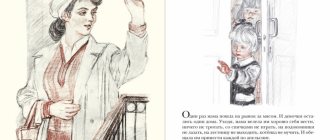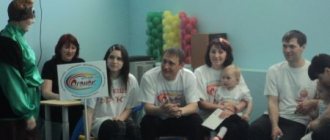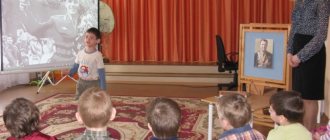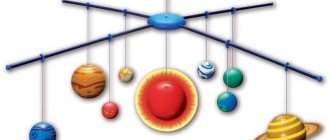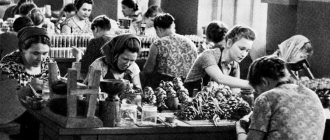Leisure activities for children of the preparatory group “Mathematical KVN”
Leisure activities for children of the preparatory group “Mathematical KVN”
Authors: Kupriyanova Lyudmila Nikolaevna, teacher of the highest qualification category
, Moshkova Larisa Vladimirovna, teacher of the second
qualification category
Municipal budgetary preschool
educational institution
- combined kindergarten No. 16 "Ryabinka" in the city of Dubna, Moscow region.
Goal: To bring children joy and pleasure from educational games. Maintain an interest in intellectual activity, a desire to play games with mathematical content, showing persistence, resourcefulness, dedication, ingenuity, mutual assistance, and an understanding of humor.
Educational tasks: • Continue to learn how to solve arithmetic examples and write their solutions using numbers; • Continue to teach children
analysis and synthesis, constructive thinking: constructing new, more complex ones from the simplest figures along a given contour; • Practice counting within 10, the ability to distinguish between quantitative and ordinal counting within 10; • To consolidate knowledge about the composition of numbers within 10 of the two smaller numbers; • Consolidate knowledge about the sequence of days of the week, seasons, months of the year; • Strengthen the ability to distinguish between concepts: higher - lower, wider - narrower, longer - shorter, thicker - thinner, older - younger.
Developmental tasks: • Create conditions for the development of logical thinking
, intelligence, attention;
• Develop ingenuity, visual memory, imagination; • Contribute to the formation of mental operations, speech development
, and the ability to give reasons for one’s statements.
Educational objectives: • To develop independence, the ability to understand an educational task and carry it out independently; • Cultivate interest in mathematical studies.
Preliminary work with children: Guessing riddles, solving logical problems, solving constructive problems, observing the calendar, individual lessons.
Children enter to the music “We are starting KVN” and stand opposite each other. 1B: Friends, today we came to our fun KVN. We brought you a smile, so that you smile every day.
2V.: You all know that KVN is a game of cheerful and resourceful people. Today two teams will compete with each other and will go through several stages of testing. The jury will evaluate your results, and at the end of the game they will sum it up and determine the winning team. Let me introduce the members of our jury: Belozerova Yulia Nikolaevna, Pavlenko Larisa Anatolyevna, Psychologist Irina Evgenievna. 1B: Our team “Znayki”. I am the coach of the Znayka team, Larisa Vladimirovna. Team captain: Dima Ivannikov. 2V.: Our team “Literacy”. I am the coach of the “Gramoteya” team, Lyudmila Nikolaevna. Team captain: Artem Kodentsev. Dima: our greeting - We are preschool children, We are not afraid of obstacles. We love to play KVN, win together and win fairly!
Artem: our greeting – We are cheerful guys and we don’t like to be bored. We will play games and win in KVN.
1B: You are very clever - we know that. We wish you good luck and success in the game. 2V.: We, friends, wish you, of course, from the bottom of our hearts, that your results will be good.
At the beginning of the game, we suggest you do a warm-up.
Z: How many ears do two hedgehogs have? G: How many tails do four cats have? Z: How many noses do three elephants have? G: How many paws do two bear cubs have? Z: How many nuts are there in an empty glass? G: Which tree does a crow sit on when it rains? Z: If the tree is taller than the bush, then the bush... (below the tree) G: If the ruler is longer than the pencil, then the pencil... (shorter than the ruler) Z: If the rope is thicker than the thread, then the thread... (thinner than the rope) G: If the sister is older than the brother, then brother... (younger than sister) Z: What day will come after Wednesday? G: What day is before Tuesday?
1V.: Well, we completed the first task, well done. And now we offer to play a fun game “Live Numbers”. Rules of the game: while the music is playing, children walk around the hall, as soon as the music stops, the children must quickly line up in order from 1 to 10 (the game is played 1 time). The jury says, the competition is assessed on a 5-point scale. Dunno enters the hall. N.: Ay-ay-ay! Oh oh oh! What to do! What do i do! How can I accommodate my friends? 2B: Look, guys, Dunno has come to us. Hello, Dunno! ON THE! What! Where I am! 2B: Dear Dunno, you came to our kindergarten for a fun KVN. Tell me, Dunno, what happened, why are you so sad? N.: How can I not be sad, I decided to build new houses for my friends, kids. And now I need to place them in rooms so that on each floor there are exactly 7 people in this house and 5 in this one. But I can't do it. 2B: Don’t be upset Dunno, now our guys will help you. Houses are placed on the board, and children, one per team, complete the task of composing a number. N.: Thank you! Helped! The kids became friends. I will now build a house. He will stand strong. You can count. Do you want to play with me?
Children: Yes, we want!
N.: Now I will count out loud, from zero to ten. I’ll forget one number, you try to find it.
Dunno counts first one, then the other team, twice.
N.: Well, thank you friends, it’s time for me to go. Goodbye, I say, I give smiles to everyone. Dunno leaves. The jury sums up the results. 1B: I went to the forest today and met some animals there. I brought them to visit us. We need to help the kids.
2B: What help do they need?
1B: Addresses children in animal masks. Come out here and tell all your friends.
Children come out wearing masks of a bear, a hare, a squirrel, and a hedgehog. M.: We are little animals, we are lost in the wilderness. We can’t find our house, we are waiting, well, who will help us.
Z.: Moms gave us hints on how to find the house number. We need to solve examples so that we can come home quickly.
B.: We didn’t go to kindergarten. We didn’t learn numbers. How can we solve this? Get a house number.
E.: I won’t find my house, And I’ll stay in the forest... (crying) 2B.: Hedgehog, dear, don’t cry. The children will be able to help you (Addresses the children) You solve examples for them, And you will receive answers.
The "Knowledge" team solves the bear and squirrel examples. M.4+4=8; B. 9-2=7. Team "Gramoteya" - hare and hedgehog. Z. 1+5=6; E. 8-3=5. On the flannelgraph there are models of houses, each with its own number. Having solved the examples, the children lead the animals to the house with the corresponding number. The jury sums up the results. Music sounds, Pinocchio enters. B.: This Malvina pretends to be smart. He also teaches constantly. You see, I can’t do anything, I don’t know. Just think she's beautiful, but she's found a smart one. 1B: Hello, Pinocchio! The battle! Hello! Where did I end up? 1B: For mathematical KVN. B.: Does this mean: K - where, V - lead, N - legs? 1B: YES not Pinocchio. KVN is a club of cheerful and resourceful people! B: How great. That's what I need. The fact is that Malvina gave me tasks. I want to go for a walk soon! But unfortunately I can’t. You will solve my problems, and let me go for a walk.
1B: If you don’t understand, you don’t know mathematics, you should teach it, so that later you can be smarter than everyone else. We will help you now, we will show you how to decide. You look, remember, and then decide for yourself. Buratino takes turns reading the terms of the problems, one per team. We're literate. The hedgehog asked the hedgehog, his neighbor, “Where are you from, fidget?” - I’m stocking up for winter, You see the apples on me. I brought five and am carrying two. The neighbor became thoughtful, How many will there be? I know. Honey mushrooms are sitting on a stump, very friendly guys. Three big ones, three small ones, small ones, remote ones - a whole family of mushrooms. How many of them are sitting on the stump?
Two children from the team come out. One lays out the problem on a flannelgraph with pictures, the other writes the condition and solution of the problem in numbers on the board.
B.: Thank you, friends! You taught me. Now I can do it myself, I will overcome all tasks. And as a reward, I want to play a game with you.
Pinocchio conducts a physical exercise called “Monkeys”.
5 monkeys were jumping in the bed. And one fell head down. Mom on the phone, the Doctor answers, “Forbid children from jumping down.” The same text with 4, 3, 2,1 - monkeys. At the end, Buratino says goodbye and leaves. The jury sums up the results of the competition - the tasks.
2B: Now I’ll tell you a few riddles. Try to guess, And then here we will collect From the “Tangram” those about whom We ask riddles.
Known: Green eyes, Thunderstorm for all mice.
Gramatey: He will be born with a beard, but no one is surprised at this.
D/i "Tangram" is being held. Children use geometric shapes to create a goat and a cat. The jury sums up the results.
Little Red Riding Hood enters the hall to the music. K.sh.: I’m a little girl, I don’t go to school. I'm going to my grandmother and bringing pies. I'm a little lost, tell me where the path is. How can I find my grandmother, How can I get to the house. Mom gave me a card, I didn’t understand it. Help me guys. How to navigate this map?
Little Red Riding Hood is holding a spatial relation competition. Children are called one by one, alternating, from each team, and each goes through their own stage according to the task, remaining in place at the end. The next child continues on from the stopped opponent. The jury sums up the results. 1B: Everyone did well today, All the teams are good. Let the Captains now show themselves - daredevils. Let me announce the Captains Competition. May they be able to surprise us with Knowledge.
Captains are offered tasks for logical thinking. For those in the know: The fisherman caught perch, ruffe, and pike. He caught the pike earlier than the perch, and the ruff later than the perch. Which fish was caught first? Which one is the latest? (1 – pike, 2 – ruff). Readers: The boys ran at speed. Sasha ran faster than Alyosha, Alyosha ran faster than Misha. Who runs the fastest? Who is slower? (1 – Sasha, 2 – Misha.) Second stage. The children are offered the game “Droodles.” The jury sums up the results and announces the winners. 1B: The game is over, it’s time for us to part. We say thank you to everyone, thank you for playing.
2B: We are also grateful to you for coming to us today, you liked the game, we want to hear - Yes!
Dima: We played today and lifted everyone’s spirits. Artem: It's time for us to say goodbye, Goodbye friends!
